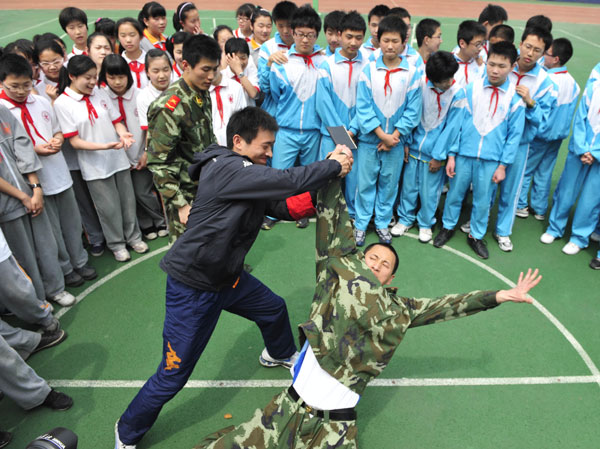Society
Campus security grows more difficult
Updated: 2011-03-24 08:01
By Chen Jia (China Daily)
|
 Police officers in Nanjing, capital of Jiangsu province, show students at a local school how to subdue a "bad guy". The demonstration took place on May 6, 2010. [Duo Duo / for China Daily] |
BEIJING - A recent increase in the number of violent crimes committed against students shows that the task of ensuring the security of the nation's campuses is growing ever more difficult, the Ministry of Education warns.
|
||||
"There were six bloody attacks on children in or near schools and kindergartens in 2010, resulting in the deaths of a dozen students and the injury of many others," he told China Daily in an exclusive interview.
On March 23, 2010, a man stabbed eight children to death in front of a primary school in Nanping, in Fujian province.
At least seven children and two adults were also stabbed to death in a private kindergarten on May 12, 2010, in Nanzheng of Shaanxi province. The same attacker managed to injure another 11 children before committing suicide.
Yu described the assailants as both being men who were between 40 and 50 years old. They had bad tempers, held extremist views and were eccentric, asocial and stubborn, he said.
"In these cases, most of the victims were children who couldn't defend themselves," Yu said. "Most of the attacks occurred when the students were entering or leaving schools or kindergartens, or when security personnel was changing shifts."
In response, the ministry has asked schools to try to prevent suspect persons from entering the schools, to spend more money on security equipment and to add to the number of guards standing on their campuses.
It also organized month-long training programs in June and July this past year. The events gave training on campus security to 483,000 school workers from across the country, according to Yu.
And 18,000 teachers received security training between November and December last year, the ministry said.
Earthquakes, landslides and other natural disasters have also placed Chinese schoolchildren in harm's way in recent years. In response, the ministry has begun using warning mechanisms to alert schools of imminent or present dangers, he said.
In 2010, fewer students died or suffered injuries in drownings, traffic accidents or building collapses, Yu said.
"The improvements in school security are obvious, but disparities between regions still exist," he said. "Schools and kindergartens in rural areas are faced with more potential dangers than those in urban areas."
For example, many rural schools have outer walls that are low and have little in the way of security equipment, he said.
To better protect children, the Ministry of Education has worked with other ministries and shared its resources with the United Nations International Children's Emergency Fund.
"Education authorities should not be the only ones responsible for campus security," said Xiong Bingqi, deputy director of the Beijing-based 21st Century Education Research Institute. "More social support is needed."
He said the government spends too little on school security. "Some kindergartens and schools have already been overburdened with tight budgets, not to mention the cost of hiring professional security guards," he added.
Specials

Tea-ing up
More turning to Chinese tea for investment opportunities like vintage wine

A cut above
The ancient city of Luoyang is home to a treasure trove of cultural wonders.

Rise and shine
The Chinese solar energy industry is heating up following recent setbacks in the nuclear sector



